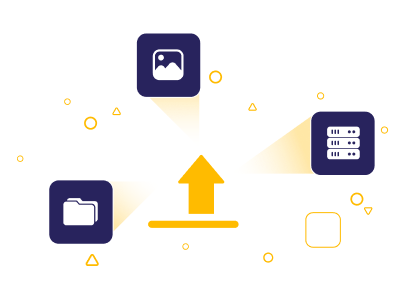Cloud computing has now become the requirement of the modern age businesses. And those businesses having a limited capital, they can leverage cheap cloud hosting solutions to host cloud projects. With the growing business and large computational power, it is because of the massive data storage systems. In this cloud computing infrastructure, organizations expand and safely transfer data from physical locations to the cloud servers. And these cloud servers are easy to access anywhere. Now, this is not only one of the essential characteristics of cloud computing.
In this blog we will walk you through the key characteristics of cloud computing. All you have to do is scroll below and read the entire post.
Who started it?
Cloud computing story began back in 2006, when AWS (Amazon Web Services) started selling cloud computing resources and the storage system. Then, Google and Microsoft entered this industry segment. As of now, cloud computing has become Software-as-a-Service (SaaS) models and everything like AI, serverless computing, IoT, business apps and many more are some of the prominent examples of cloud computing.
Key Features of Cloud Computing
Easy Maintenance
If you are dealing with server operations, there is a chance of downtime. With the help of Cloud computing, you will not face such issues. Every time Cloud Computing is improved, it gets updated. Compared to older updates, the updated ones are more compatible with the devices and perform faster along with fixing bugs.
Availability
Cloud capabilities can be modified and extended according to the use case. Analysing the cloud storage is easier and you can buy extra storage when there is a requirement for a small amount.
Automatic System
In some cases, cloud computing provides metering capabilities and automatically analyzes data. Monitoring, controlling, and reporting are all possible. As well as providing transparency to the host, it will also benefit the customer.
Related: Everything You Need to Know about Cloud Computing [Features, Benefits, Challenges]
Economical
Cloud computing is an economical investment, as the company (host) has to buy storage and a small portion can be shared with multiple companies, saving the host money from monthly or yearly fees. It is mostly spent on basic maintenance and a few other expenses, which are very small.
Resource Pooling
There is no doubt that cloud computing is adding value to businesses which help organizations to scale their revenue. And the reason behind is different systems, devices and other resources that add value in businesses and serve different requirements of users. With the multi-tenancy model in the cloud computing users are getting the same infrastructure at the same time.
Furthermore, cloud computing helps customers choose the best application, network, or server that matches their requirements. It is because the computing system has a pool of resources, which offers the customers the best resources.
Pick MilesWeb’s Managed Cloud Hosting Plans for High-Performance!
Huge Network Access
Because cloud computing is accessible via the internet, it offers a wide range of services, one of which is broad network access. The network can be accessed from anywhere by the users. Moreover, they can use any device, including mobile phones, tablets, office computers, and personal laptops.
For businesses looking to increase their brand value in the current market, cloud computing is an ideal choice. Furthermore, cloud computing systems let businesses store and transfer data in a secure manner that is inaccessible to third parties. Additionally, it allows brands and consumers to interact securely.
Scalability and Rapid Extensibility
There are a number of benefits and characteristics associated with cloud computing, including its ability to grow and shrink rapidly. With this cloud feature, workloads that use many servers but are only needed for a short time, such as database servers, can be operated at a low cost. Due to Cloud Computing’s rapid elasticity, many customers have workloads that can be performed cost-effectively.
Economic Considerations
Enterprises are able to reduce their overall IT expenditures. Customers who use Cloud Computing services are responsible for compensating the administration for the space they have used. In this case, there is no need for further payment or cover-up. Consequently, the administration is simple and most of the time, free space is made available to them.
Service for Measuring and Reporting
The availability of reporting services is one of the fundamental characteristics of cloud computing that makes it an ideal option for enterprises. It is beneficial for both cloud providers and their customers to offer measured services in Cloud Computing. It helps both suppliers and customers track and report services used as well as the purpose for which they were used. This aids in monitoring bills and ensures the most efficient use of available resources.
Security Is an Important Feature
A major advantage of cloud computing is its ability to protect personal information. Cloud computing service makes a backup copy of the saved data to prevent data loss. A copy of the data from the other server can be used to recover the lost data if one of the servers fails by accident. When several people are working on a single file in real-time, and the file becomes corrupted at the same time, this capability comes in handy.
Related: Theory And Practice Of Cloud Services Networking
Automated Systems
Cloud computing is characterized by its complete automation. Essentially, it involves utilizing technology in the most efficient way while eliminating physical labor. However, achieving computerization in a cloud network is not without its challenges. Virtual technologies, servers, and enormous amounts of storage must be installed and configured and it is one of the major cloud characteristics in cloud computing. In the event that these properties are successfully placed, regular maintenance will be required.
Resistance to Change
Cloud computing’s resilience refers to its ability to recover quickly from interruptions. After an injury or damage to its databases, servers, and network infrastructure, a cloud’s strength is evaluated by how quickly it can restart and recover. Cloud computing is also characterized by its high level of availability. There are no geographical restrictions or limitations to using cloud services because they can be accessed from anywhere in the world.
Different Types of Cloud Computing
The types of cloud computing can be summarized as the paradigm for measuring the amount of control and services a business seeks. Cloud computing can be classified into three types:
- Infrastructure as a service (IaaS)
- Platform as a service (PaaS)
- Software as a service (SaaS)
The concept of infrastructure as a service (IaaS) refers to an internet-based cloud solution that includes computer power usage. Through IaaS, users can rent their IT infrastructure to perform various services, including storing, transmitting, and interacting.
Platform-as-a-service and software-as-a-service are other types of cloud computing that enhance the utility of cloud applications and devices. A PaaS service allows users to build and host applications on the cloud, while a SaaS service delivers software on the cloud.
Access to A Large Network
Cloud computing is characterized by its widespread availability. To view cloud information or send information to the cloud, the client needs a device and an internet connection.
Throughout the company, these capabilities can be accessed through the internet. By monitoring and ensuring a variety of metrics that represent how customers access cloud services and data, such as data throughput, access time, latency, and so forth, cloud providers reduce the need for significant network access.
Conclusion
Web hosting providers and customers alike benefit from Cloud Computing’s essential characteristics. A host offers a variety of perks to customers, all of which are beneficial for their business. There is a significant need for data storage at the moment for the company. As outlined above, Cloud Computing is popular among enterprises across a wide range of industries because of its characteristics.







